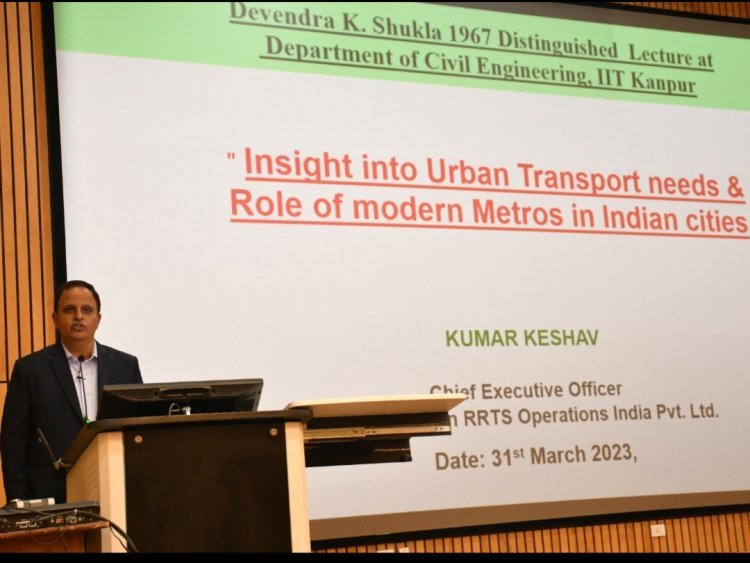Former UPMRCL Managing Director Kumar Keshav Delivers Guest Lecture on the Role of Modern Metros in Indian Cities


Former UPMRCL Managing Director Kumar Keshav Delivers Guest Lecture on the Role of Modern Metros in Indian Cities
The Department of Civil Engineering at IIT Kanpur welcomed former UPMRCL Managing Director Shri. Kumar Keshav to deliver Devendra K. Shukla 1967 Distinguished Lecture titled "Insights into Urban Transport Needs and Role of Modern Metros in Indian Cities". The presentation explored the relationship between urban transport needs and the role of modern metros in Indian cities.
Kumar Keshav, who is currently working as the Chief Executive Officer (CEO) of DB RRTS, Operations India Private Limited, which is a subsidiary of Deutsche Bahn International Operations GmbH, Berlin, the National Railway Company of Germany. Engagement of DB as an operator had paved the path for the transfer of knowledge, best international practices, and managerial services available around the globe by DB to the Indian metro and rail O&M industries.
DB IO has been commissioned to manage the operation and maintenance of the regional rapid transit system (RRTS) that National Capital Region Transport Corporation (NCRTC) is implementing. The project will connect the cities of Delhi, Ghaziabad and Meerut. It will cover 82 kilometers, 25 stations and two depots.
The twelve-year contract is worth over a hundred million. DB IO will operate 40 trains on the Delhi-Meerut RRTS corridor and will also be responsible for maintaining the rail infrastructure. Once fully operational, the network is expected to carry more than 800,000 passengers a day.
As India's cities continue to rapidly grow, metro systems are becoming an essential part of the transportation mix. Despite the high capital costs associated with metro rail projects, the government has opted for these projects to meet the transportation needs of the people within the city. During his lecture, Keshav emphasized the importance of designing rail transport systems which includes Metro and RRTS project with a futuristic approach that considers peak hour peak direction traffic.
Keshav's presentation also highlighted the fact that the capital cost of any metro project is only 40 percent of its total life cycle cost, while 60 per cent of the life cycle cost comes from operations, maintenance, asset management, and other expenses. To ensure the profitability of a metro project, Keshav stressed the importance of planning the entire vision and philosophy of operations and maintenance at the design phase itself to avoid issues of financial sustainability.
Keshav further added that urban mass transit systems should be planned not just as transport models but also as business models to ensure profitability. He emphasized the importance of optimizing operational and technological redundancies adoption to meet the transportation needs of the modern urban environment.
The lecture was attended by faculty members and students of the Department of Civil Engineering at IIT Kanpur. Keshav's insights and experience in the field of metro rail projects were highly appreciated by the attendees.

















